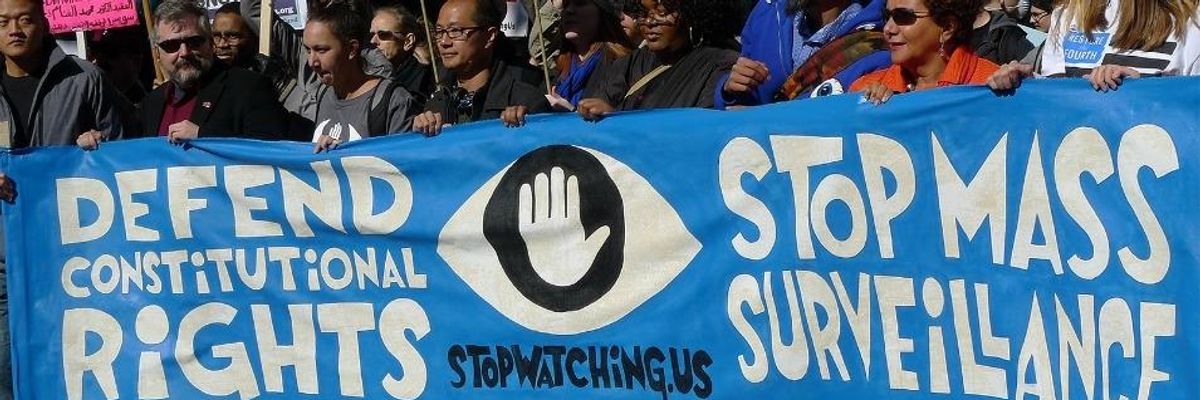
Protesters march in a demonstration demanding an end to government mass surveillance in Washington, D.C. on October 26, 2013. (Photo: Susan Melkisethian/flickr/cc)
Director of National Intelligence Admits Government Used Section 215 to Track Browsing History
After initially denying the practice, Director of National Intelligence John Ratcliffe admitted the government engaged in activity "that could be characterized" as tracking website visits.
The Trump administration recently used one of the most controversial surveillance provisions in U.S. history to record an unidentified person or group's visit to an unspecified website, the New York Times revealed Thursday.
"The DNI's amended letter raises all kinds of new questions, including whether, in this particular case, the government has taken steps to avoid collecting Americans' web browsing information."
--Sen. Ron Wyden
The Times reports Director of National Intelligence John Ratcliffe wrote to Sen. Ron Wyden (D-Ore.) on November 6 to inform him that Section 215 of the USA PATRIOT Act had not been used to collect internet search terms, and that none of the 61 Foreign Intelligence Surveillance Court orders issued in 2019 involved "web browsing" records.
However, Ratcliffe was later forced to change his story.
Under pressure from the Times and following clarification from the U.S. Justice Department, Ratcliffe wrote to Wyden to admit that "one of those 61 orders resulted in the production of information that could be characterized as information regarding browsing," and that one order approved the collection of data regarding computers "in a specified foreign country" that were used to visit "a single, identified U.S. web page."
Wyden responded to Ratcliffe's clarification--the director called it a "corrective action"--by urging Congress to enact more robust privacy protections.
"The DNI's amended letter raises all kinds of new questions, including whether, in this particular case, the government has taken steps to avoid collecting Americans' web browsing information," Wyden said in a statement on Thursday.
"More generally, the DNI has provided no guarantee that the government wouldn't use the PATRIOT Act to intentionally collect Americans' web browsing information in the future, which is why Congress must pass the warrant requirement that has already received support from a bipartisan majority in the Senate."
Section 215, which was passed in the fear-filled days following the September 11, 2001 attacks on the United States, weakened protections put in place in 1978 with the enactment of the Foreign Intelligence Surveillance Act (FISA), which was meant to correct the most egregious and illegal surveillance revealed by the Church Committee.
Armed with what privacy advocates have called flagrantly unconstitutional surveillance powers, "the executive branch has been in nearly constant violation of FISA and the rules governing surveillance since [9/11], and during this time, it has warrantlessly collected information on virtually every American," according to Demand Progress. The group explains that:
Section 215 expanded a provision of FISA to provide the government with broad authority to collect vast swaths of records held by businesses--including in the absence of any allegation of wrongdoing. These records reveal personal details about people's lives, like whom they call, when, and for how long.
Section 215 orders also apply to people's purchase records, which reveal what people buy, when, and where. Location, medical, and firearms sales records are among the other digital and physical things subject to Section 215.
During the George W. Bush administration, Section 215's authorization of the collection of library records sparked widespread national outrage. Later, during the administration of President Barack Obama, National Security Agency whistleblower Edward Snowden revealed that Section 215 was being used to enable the bulk metadata collection of every U.S. phone call.
Snowden's revelations prompted Congress to limit such collection by passing the USA FREEDOM Act in 2015.
Section 215 expired in March 2020. In May, the Senate voted to reauthorize the FREEDOM Act. However the bill is currently stalled pending reconciliation with the House.
An Urgent Message From Our Co-Founder
Dear Common Dreams reader, The U.S. is on a fast track to authoritarianism like nothing I've ever seen. Meanwhile, corporate news outlets are utterly capitulating to Trump, twisting their coverage to avoid drawing his ire while lining up to stuff cash in his pockets. That's why I believe that Common Dreams is doing the best and most consequential reporting that we've ever done. Our small but mighty team is a progressive reporting powerhouse, covering the news every day that the corporate media never will. Our mission has always been simple: To inform. To inspire. And to ignite change for the common good. Now here's the key piece that I want all our readers to understand: None of this would be possible without your financial support. That's not just some fundraising cliche. It's the absolute and literal truth. We don't accept corporate advertising and never will. We don't have a paywall because we don't think people should be blocked from critical news based on their ability to pay. Everything we do is funded by the donations of readers like you. Will you donate now to help power the nonprofit, independent reporting of Common Dreams? Thank you for being a vital member of our community. Together, we can keep independent journalism alive when it’s needed most. - Craig Brown, Co-founder |
The Trump administration recently used one of the most controversial surveillance provisions in U.S. history to record an unidentified person or group's visit to an unspecified website, the New York Times revealed Thursday.
"The DNI's amended letter raises all kinds of new questions, including whether, in this particular case, the government has taken steps to avoid collecting Americans' web browsing information."
--Sen. Ron Wyden
The Times reports Director of National Intelligence John Ratcliffe wrote to Sen. Ron Wyden (D-Ore.) on November 6 to inform him that Section 215 of the USA PATRIOT Act had not been used to collect internet search terms, and that none of the 61 Foreign Intelligence Surveillance Court orders issued in 2019 involved "web browsing" records.
However, Ratcliffe was later forced to change his story.
Under pressure from the Times and following clarification from the U.S. Justice Department, Ratcliffe wrote to Wyden to admit that "one of those 61 orders resulted in the production of information that could be characterized as information regarding browsing," and that one order approved the collection of data regarding computers "in a specified foreign country" that were used to visit "a single, identified U.S. web page."
Wyden responded to Ratcliffe's clarification--the director called it a "corrective action"--by urging Congress to enact more robust privacy protections.
"The DNI's amended letter raises all kinds of new questions, including whether, in this particular case, the government has taken steps to avoid collecting Americans' web browsing information," Wyden said in a statement on Thursday.
"More generally, the DNI has provided no guarantee that the government wouldn't use the PATRIOT Act to intentionally collect Americans' web browsing information in the future, which is why Congress must pass the warrant requirement that has already received support from a bipartisan majority in the Senate."
Section 215, which was passed in the fear-filled days following the September 11, 2001 attacks on the United States, weakened protections put in place in 1978 with the enactment of the Foreign Intelligence Surveillance Act (FISA), which was meant to correct the most egregious and illegal surveillance revealed by the Church Committee.
Armed with what privacy advocates have called flagrantly unconstitutional surveillance powers, "the executive branch has been in nearly constant violation of FISA and the rules governing surveillance since [9/11], and during this time, it has warrantlessly collected information on virtually every American," according to Demand Progress. The group explains that:
Section 215 expanded a provision of FISA to provide the government with broad authority to collect vast swaths of records held by businesses--including in the absence of any allegation of wrongdoing. These records reveal personal details about people's lives, like whom they call, when, and for how long.
Section 215 orders also apply to people's purchase records, which reveal what people buy, when, and where. Location, medical, and firearms sales records are among the other digital and physical things subject to Section 215.
During the George W. Bush administration, Section 215's authorization of the collection of library records sparked widespread national outrage. Later, during the administration of President Barack Obama, National Security Agency whistleblower Edward Snowden revealed that Section 215 was being used to enable the bulk metadata collection of every U.S. phone call.
Snowden's revelations prompted Congress to limit such collection by passing the USA FREEDOM Act in 2015.
Section 215 expired in March 2020. In May, the Senate voted to reauthorize the FREEDOM Act. However the bill is currently stalled pending reconciliation with the House.
The Trump administration recently used one of the most controversial surveillance provisions in U.S. history to record an unidentified person or group's visit to an unspecified website, the New York Times revealed Thursday.
"The DNI's amended letter raises all kinds of new questions, including whether, in this particular case, the government has taken steps to avoid collecting Americans' web browsing information."
--Sen. Ron Wyden
The Times reports Director of National Intelligence John Ratcliffe wrote to Sen. Ron Wyden (D-Ore.) on November 6 to inform him that Section 215 of the USA PATRIOT Act had not been used to collect internet search terms, and that none of the 61 Foreign Intelligence Surveillance Court orders issued in 2019 involved "web browsing" records.
However, Ratcliffe was later forced to change his story.
Under pressure from the Times and following clarification from the U.S. Justice Department, Ratcliffe wrote to Wyden to admit that "one of those 61 orders resulted in the production of information that could be characterized as information regarding browsing," and that one order approved the collection of data regarding computers "in a specified foreign country" that were used to visit "a single, identified U.S. web page."
Wyden responded to Ratcliffe's clarification--the director called it a "corrective action"--by urging Congress to enact more robust privacy protections.
"The DNI's amended letter raises all kinds of new questions, including whether, in this particular case, the government has taken steps to avoid collecting Americans' web browsing information," Wyden said in a statement on Thursday.
"More generally, the DNI has provided no guarantee that the government wouldn't use the PATRIOT Act to intentionally collect Americans' web browsing information in the future, which is why Congress must pass the warrant requirement that has already received support from a bipartisan majority in the Senate."
Section 215, which was passed in the fear-filled days following the September 11, 2001 attacks on the United States, weakened protections put in place in 1978 with the enactment of the Foreign Intelligence Surveillance Act (FISA), which was meant to correct the most egregious and illegal surveillance revealed by the Church Committee.
Armed with what privacy advocates have called flagrantly unconstitutional surveillance powers, "the executive branch has been in nearly constant violation of FISA and the rules governing surveillance since [9/11], and during this time, it has warrantlessly collected information on virtually every American," according to Demand Progress. The group explains that:
Section 215 expanded a provision of FISA to provide the government with broad authority to collect vast swaths of records held by businesses--including in the absence of any allegation of wrongdoing. These records reveal personal details about people's lives, like whom they call, when, and for how long.
Section 215 orders also apply to people's purchase records, which reveal what people buy, when, and where. Location, medical, and firearms sales records are among the other digital and physical things subject to Section 215.
During the George W. Bush administration, Section 215's authorization of the collection of library records sparked widespread national outrage. Later, during the administration of President Barack Obama, National Security Agency whistleblower Edward Snowden revealed that Section 215 was being used to enable the bulk metadata collection of every U.S. phone call.
Snowden's revelations prompted Congress to limit such collection by passing the USA FREEDOM Act in 2015.
Section 215 expired in March 2020. In May, the Senate voted to reauthorize the FREEDOM Act. However the bill is currently stalled pending reconciliation with the House.

